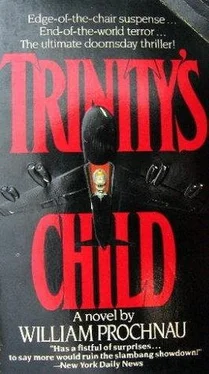Tierra del Fuego. That’s it. They could figure it out in Tierra del Fuego. Harpoon felt very guilty. He closed his eyes.
Alice had problems. The first orders to the B-52’s, briefly and tersely instructing them to orbit and hold, had gone out. Now he had most of his staff, including many whose expertise had no relationship whatsoever to their new assignment, working on the target changes. They struggled with the fuel loads and locations of the eleven remaining B-52’s. They struggled with coordinates for the green dots. They struggled to arrange packages of dots for each aircraft, trying to keep the packages practical while pushing the practicalities to the limit. They struggled to assign priorities within each package—which dots were important enough for a direct bomb run, which were secondary enough to risk a looping shot with the highly accurate but less-powerful missiles. A few, such as the choice morsel he had assigned to Polar Bear One, were double-targeted with a bomb run by one aircraft and a missile launch by another. It was a given that not all the Buffs would get through.
It also was a given—and Alice wasted no thought on it now—that the intelligence reading was reasonably accurate. For almost two decades neither nation had dug anything larger than a well without an electric eye watching. The ruses—this one’s a mine, that one’s a waste-storage facility—had been unraveled by spies and dissidents in both countries. Who would go where and under what circumstances had been the job of moles who had begun their burrowing a generation ago. There were few secrets, and no places to hide.
In a way, as he plodded through the special task he had taken on as a personal obligation to an old friend, Alice felt a profound sense of relief. This, after all, was the decision he had not wanted attached to his soul. And until Harpoon had swooped into Baton Rouge and rescued the man with the western drawl, it had been Alice’s to make. One way or the other. Still…
Alice tapped his ruddy fingers on the set of targets he had drawn up for Polar Bear One. Cherepovets plus five. A grand tour, sneaking in the Soviet back door and plunging at the heart plus a handful of major arteries.
Alice reached for a computer printout sheet of the targets struck by the Soviets. A cursory glance confirmed what didn’t need confirmation. They had not struck the most sensitive new American bunker in West Texas. They had not struck Mount Weather, the ancient bunker in Virginia so well-known the press wrote about it. They had taken a crudely surgical slice at Washington, messing up the city pretty badly in their attempt to isolate out military targets. But they had not totally destroyed the capital. He shook his head in dismay. He didn’t like this, didn’t like it at all.
Alice looked up and saw Sam watching him curiously. The general quickly looked back down at his papers. Dammit, Sam, don’t you be my conscience. You follow orders in this business or the business doesn’t work. If you’re aboard the Enola Gay, you fly over Hiroshima and forget it. If you’re ordered to drop incendiaries on civilians in Dresden, you do it. And forget it. If you read later that the people raced screaming into the sea, burning phosphorous glued to their backs and burning underwater, you forget it again. That’s modern life. Modern war. Very goddamn modern.
“You about ready, Sam?” Alice asked brusquely.
“Yes, sir. We have the orders plotted.”
“Then send ’em, dammit.”
And so they began sending the new orders. Slowly. On the reliable, low-frequency teletype.
The audio alert startled everyone. Kazakhs quickly stubbed out a cigarette. Moreau craned her neck toward the small teletype and watched in puzzlement as the machine started and stopped almost immediately. Halupalai, the pacing expectant father earlier, lumbered slowly out of the back and pulled the oneline message from its reel. Without glancing at it, he handed the paper to Kazakhs. There was a moment of silence as Kazakhs examined it. Then he handed it back and said, “Tell me what I already know.”
Halupalai read it aloud, methodically decoding in his head. “Orbit. Await orders.” The gunner paused and added, “I’ll take it downstairs, commander.”
“Don’t bother.”
“Commander?”
“Don’t bother!” Kazakhs repeated, a frustrated touch of meanness in his voice. Halupalai shrugged and slouched back to his isolated seat.
“Take it easy on him,” Moreau reproached the pilot. “You’ll have the whole crew ready for the rubber room.”
Kazaklis stared into the instrument panel and then turned angrily on her. “Do me a favor, Moreau. Bank the Doomsday Express left. Then shut up for a while, will ya? Huh?”
Moreau bristled, hardly having spoken since the detonation, and began placing the plane in orbit again.
Kazaklis glumly took a reading on their position. One hundred fifty miles into the Arctic Ocean. He glanced at his luminous watch. The minute hand had crept past 1100 Zulu. Five hours that seemed like five years. And they still didn’t know where they were heading. He turned toward Moreau and saw the woman wheeling the aircraft intently, professionally into a slow orbit. He tried to drive the agitation out of himself.
“You ever kick your dog, Moreau?”
“I don’t have a dog, Kazaklis,” she said tersely.
“I love my dog.”
Moreau looked at him, shook her head, and said nothing.
“You get the feeling we’re going around in circles?” he asked, the lightheartedness sounding artificial.
“You get the feeling we shouldn’t complete this circle?” she asked. Her voice carried a strange mix of hostility and pensiveness. It so caught Kazaklis by surprise he briefly went wordless. He forced a laugh.
“Reminds me of a Polish joke.”
“Oh, Christ, Kazaklis.”
“These two Polish pilots get into trouble. So the pilot says to the copilot, ‘Let’s do a 360 and get out of here.’” Kazaklis laughed. Moreau didn’t. Kazaklis went silent again.
“I think the Polacks have taken over the Looking Glass,” he continued after a second. Now his voice was pensive. “Do a couple of 360’s and then move ahead one square.” He paused. “What do you make of this crap?”
Moreau thought for a second. “Maybe they’re going to pull us back.”
Kazaklis looked at Moreau, tucking his chin into his Adam’s apple, his eyes peering mockingly out of the bottom of his eyebrows. “Oh, yeah, Moreau. I can hardly wait.”
“I can think of reasons.”
“I almost forgot you’re a general’s brat.” Kazaklis immediately wished he had kept his loose tongue tucked away.
“Shove it, Kazaklis.”
“I kick my dog a lot, Moreau.”
She looked at him in curiosity, then shook her head again.
“Well, Moreau,” the pilot continued, “you can explain the strategic reasons to me when we’re at low level over Baikal.”
“That’s one place we’re not going now.”
“I know.”
They dropped off into silence again, the Buff curling into its holding pattern, the hum of the engines deceptively lulling after the bone-jarring rumble with the Foxbats. Both retreated into their private worlds, trying to sort out the tangle of new realities forced upon them in the few short hours since the klaxon’s wail at Fairchild, the bombs bursting in Spokane, their own bomb bursting behind them.
“You really don’t think about the reliability regulations, do you?” Moreau suddenly broke the silence.
“Oh, God, Moreau, don’t start on PRP now.”
“Why don’t you think about it?”
Kazakhs sensed danger. His head told him to cut Moreau off. Quickly. But he didn’t. “Because it’s crazier than what we’re doing,” he said sullenly.
Читать дальше












